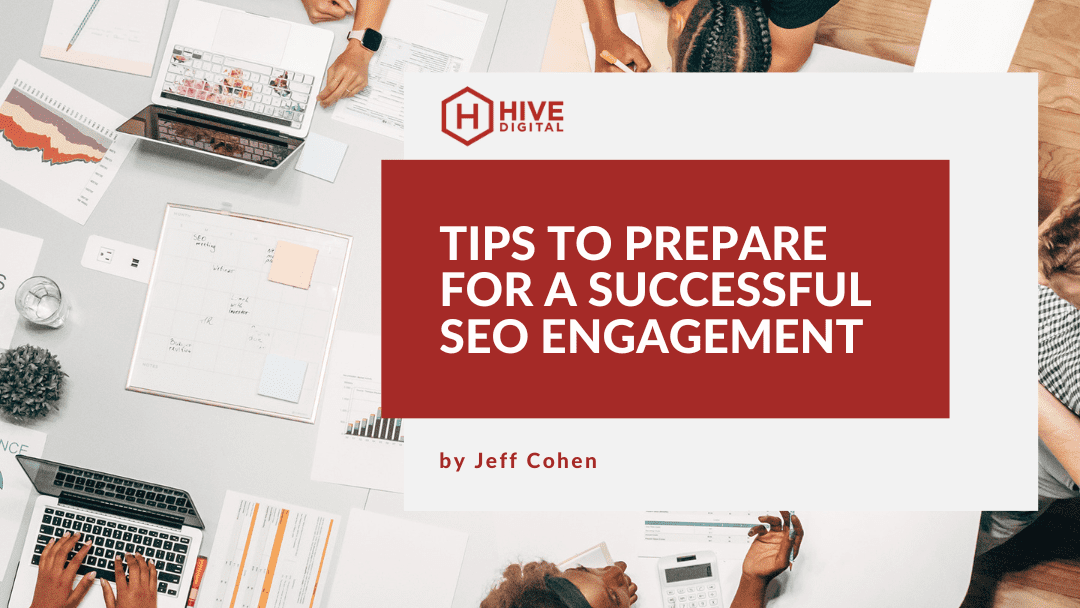Tips To Prepare For A Successful SEO Engagement
When it comes to website marketing efforts, one of the key elements is making sure you have a plan for search engine optimization (SEO). By helping your website improve its presence in the organic search engine results pages (SERPs), you can dramatically increase your visibility and boost traffic. You’ll often hear that SEO can be an ever-changing effort – new ways to build sites, a myriad of CMS platforms, and search engines always updating algorithms. This is why it can be extremely beneficial to partner with an experienced SEO agency.
But at the end of the day SEO isn’t rocket science, and the core rules of website optimization have held steady for a long time – in a nutshell: create a quality experience that offers solutions to what people are looking for. Sure, the best practices for things like UX, page speed, schema, etc. change and refine over time, which is why working with an agency that is doing their due diligence to keep up with the latest best practices and using the various tactics and tools can be so beneficial.
While experience is definitely a plus, I can attest first-hand as someone who has been on both sides of the table, both as a client at mid-size and large organizations and as a consultant working at some great agencies, that the best efforts most often come when clients and consultants work as collaborative partners.
With that in mind, it’s important to know how to prepare and get in the right mindset for the SEO engagement. Whether you’re the client or the consultant, here are a few things to consider to help ensure that everyone is ready to work together for shared success.

1. Understanding SEO Objectives
First, be clear about the goals. What exactly do we want to achieve with these SEO efforts? How do they align with the overall business goals? How can they fit in and assist with the efforts from other channels (paid ads, social media, email campaigns, and offline efforts)?
Client: What do you consider your main KPIs to be?
It could be something standard like increasing traffic, increasing leads or improving Organic Search visibility for certain topics and keyword themes.
SEO Team: What should the KPIs be to measure Organic Search efforts?
Be sure to listen and understand the business goals for the client but be sure to explain that goals for Organic Search may differ from other channels. SEO is often described as a long-game and depending on a variety of factors things like revenue or leads may not be effective at showing the impact of SEO efforts. Also be sure to consider things beyond just “improve ranking for keyword XYZ”. In many cases it may be more beneficial to track keyword themes, page sets, or even just overall impressions.
Where Can We Make Sure The Marketing Goals Align
Once everyone understands the business needs, and how SEO efforts can compliment the overall digital marketing plan you can align goals, set benchmarks, develop a plan to assess your current situation, put together an effective set of tactics and measure performance effectively.
2. Ensure Everyone Who Needs To Be Involved Is Involved
As a SEO agency, one of the most important things we can do is to collaborate with our clients. After all, they are the experts on their business, and we are the experts on SEO. By working together with their teams, we can create a campaign that is targeted, effective, and successful.
Get Into The Collaborative Mindset: SEO Works Better When It’s Not…
- The SEO team being order takers
- The SEO team dictating updates
The SEO efforts really are a team effort. From the initial research and keyword selection to on-going content creation and link building, effective SEO requires collaboration and buy-in from everyone on the team.
With that in mind, there are a few key people that you’ll want to be sure are involved at some level with the engagement:
- The project manager: Or some main point of contact who is responsible for overseeing SEO efforts and ensuring that key objectives and deadlines are relayed.
- The copywriter: If you have in-house (or even outsourced) copywriters that will be creating content then they need to be able to work closely with the SEO team early. It can be hugely beneficial to help refine keyword focus and content planning when all parties understand things like tone and any copy requirements (brand name usage, standard nomenclature, words to avoid, etc.). Conversely, your SEO team should be able to provide tips and guidance to help the copy team understand SEO best practices and provide guardrails with content briefs so they can create content in a way that is optimized for search engines, but written humans.
- The web developer: This role is typically responsible for maintaining and updating a website’s code. Your SEO team will likely do a variety of SEO Tech audits to ensure the site is crawler friendly and compliant with all the latest standards for things like page speed, schema, no broken links, etc.
Don’t Forget Your Other Digital Marketing Teams
Beyond the teams that may be working directly to support the SEO efforts, be sure to take some time to make sure other teams are aware that you’re working on optimizing the site for Organic Search efforts. If you have groups working on paid search, display, remarketing, email, social media, and even off-site marketing it can be very helpful to make sure all efforts are in alignment. Keeping messaging consistent, supplementing weak spots or seasonal downtrends, improving landing pages, and even sharing top performing efforts across teams can help ensure that every slice of your marketing pie grows together rather than just shifting success from one channel to another.

3. Who Owns What – Deliverables With Your SEO Agency
At the start of the engagement, it’s vital to make sure that a process is clearly outlined so that all teams know what’s expected to keep the project moving smoothly.
- What teams own the various aspects of the work
- Deliverables, site updates, etc.
- Are there any IT needs, site access, or security protocols that need to be followed?
The SEO Agency should provide a general or even detailed list of the various deliverables the client can expect over the course of the project. In addition, they should be able to convey if input is needed from the client for things like target focus, content review, take live approval and more.
On the client side, they’ll need to inform the SEO team if there are hard requirements like stakeholder sign-off, legal team review, developer requirements, who’s expected to push content live, etc.
4. Manage Communications For SEO Efforts Efficiently
The project managers on both sides will need to communicate effectively between the client teams and the SEO Agency to ensure that expectations are being met. Don’t feel bad about holding your SEO partners accountable, if things feel like they’re not on track make sure all parties know as early as possible to get realigned.
- Establish standard communication process
- Schedule your face-to-face meeting cadence and flow
- Work together to create deliverable flow and format
- Could this have been an email?
Don’t Be Afraid Of The Bad News, Be Ready To Pivot SEO Tactics
It’s important to be realistic about what an SEO campaign can achieve. It takes time and effort to see results from an SEO campaign, so don’t expect miracles overnight. Work with your agency to set realistic expectations and timelines.
For example, during the initial audit and discovery phase the SEO team may find that there are potential issues that could hinder any efforts. Depending on previous work there could be problems like a lack of overall content, too much content with unclear themes, overall site bloat, or any number of technical issues where the website is hindered by poor UX or site speed. Whether it’s a couple of items or a myriad of issues, it’s important to make sure you and your teams don’t take the results of these audits personally. Instead, think of this as an opportunity to clean and rebuild where needed. If the foundation of the site isn’t in order, then even the best content will still struggle to get ranked, and you won’t be able to achieve your desired results.
5. Tracking Your SEO Efforts And Setting Up Milestones
Beyond monthly observations, set up a time to review performance against established touchpoints and be ready to tweak or change course as needed. Quarterly, twice a year, yearly… what makes the most sense based on the type of work being done and how it aligns with the business goals.
Some clients have established web reports and dashboards, or in some cases we may need to create additional reporting to track SEO efforts specifically. In either case, be sure to set these up at the beginning of the engagement so we can benchmark and track the effectiveness of the efforts.
Make The Most Of Your SEO Engagement
If you’ve decided it’s time to improve the performance of your website’s organic channel, one of the best things you can do is collaborate with a great SEO Agency (like us for example). By working with a team of experienced SEO specialists, you can improve your presence in the organic search results for target themes that are important to your business and drive more qualified traffic. Working with an SEO Agency is an great way to boost your overall web marketing efforts.
Quick SEO Engagement Takeaways…
- Be clear about goals. What do you hope to achieve with your SEO campaign? Make sure you communicate your goals to your SEO Agency so that they can tailor their approach accordingly.
- Collaborate and share your knowledge. Give your SEO Agency as much information as possible and ensure key internal groups are in the loop so all teams can work together to be able to help you achieve your goals.
- Establish deliverable expectations. Your SEO Agency will have a lot of great ideas for how to improve your website and attract more visitors. Be sure to establish a clear and efficient process for implementing them.
- Keep lines of communication open. Throughout the duration of your SEO campaign, stay in touch with your SEO Agency so that you can monitor progress and address any concerns that arise along the way.
- Track it, track it, track it. Review performance regularly and be ready to adjust tactics if needed and celebrate the successes.
By following these tips, you can ensure that you collaborate effectively with your SEO Agency and create a successful partnership.
So if you’re interested in partnering with a group of experienced SEO experts (who happen to also be very cool), and learning how we can help to improve your organic efforts, feel free to connect with our team for your free consultation.

